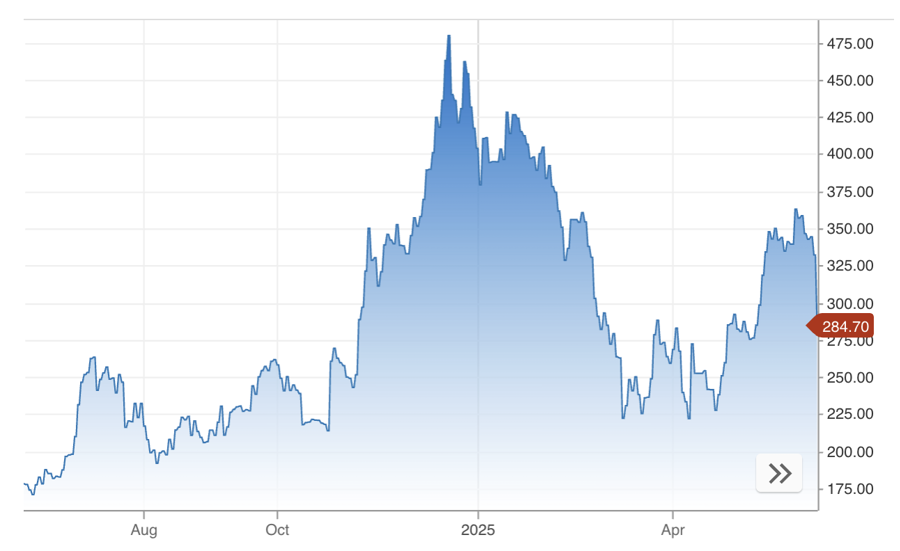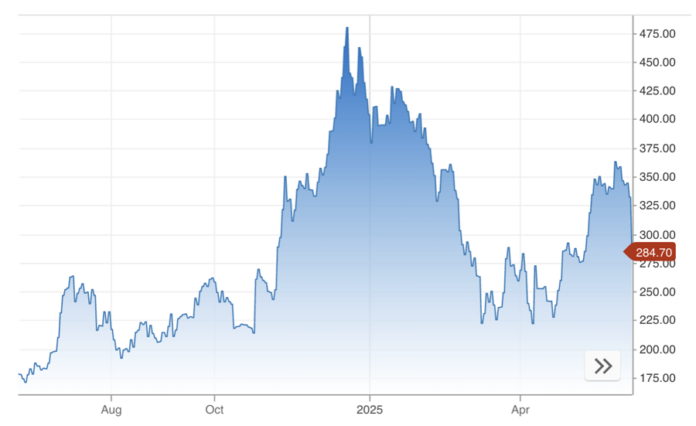The latest developments mark an escalation in the verbal spat between Musk and Trump over the latter’s budget bill currently being debated in the US Congress.
The slump wiped off $152 billion from Tesla’s market capitalization, the biggest single-day loss for the electric car maker. This drop pushed Tesla’s market cap below the $1 trillion mark, ending the session at $916 billion.
Speaking from the Oval Office on June 5, Trump commented on Musk’s frustration regarding the absence of electric vehicle credits in the tax-cut and spending bill being discussed in the Senate after passing the House. “Elon and I used to get along very well. I don’t know if we do anymore. I may have to run against him,” he remarked.
Musk hit back at Trump’s remarks on social media platform X: “Without me, Trump wouldn’t have won.”
Trump later responded on Truth Social, stating that Musk had “gone crazy” and lost his patience.
In recent days, Musk, the world’s richest person, has been vocal in his criticism of Trump’s budget bill, marking a significant shift in his stance towards the Trump administration. Musk has also stepped down from his role in the White House, where he headed the Department of Operational Excellence (DOGE) for about five months.
Despite disappointing sales figures in May, Tesla’s stock rose 22% as investors were buoyed by Musk’s announcement that he would withdraw from politics to focus on running the company.
However, Tesla’s stock plummeted 18% this week as Musk repeatedly criticized the budget bill. Year-to-date, Tesla’s stock is down nearly 30% and is trading well below its record high of $488.54 per share set on December 18 last year. On June 5, the stock closed at $284.70 per share.
Musk, during his final days in the White House, expressed disagreement with Trump’s spending bill. After his departure, he has become more vocal in his opposition to the bill, which includes an extension of the 2017 tax cuts.
“Elon has a tendency to say whatever’s on his mind. He doesn’t hold back, and he seems very disgruntled,” said Walter Isaacson, author of a Musk biography, in an interview with CNBC.
According to NBC News, Musk attempted to persuade Trump and other Republican administration members to alter the budget bill’s provisions on electric vehicle and solar tax credits, to Tesla’s benefit, but to no avail. The bill also imposes an annual fee of $250 on electric vehicle users.

In addition to the headwinds from Trump’s budget bill, Tesla faces more fundamental challenges, including a sharp drop in electric vehicle sales in key markets like Europe and a decline in brand reputation in Western markets overall. The company is also under pressure to launch its long-delayed autonomous taxi service in Austin, Texas, this month.
While Musk has stated that Tesla will test its autonomous taxi service in Austin, rival Waymo has already commercialized a similar service through a partnership with Uber.
Isaacson further noted that Musk was displeased with the opposition from some Trump administration members to the nomination of Jared Isaacman, a Musk associate, as the head of NASA. The nomination was withdrawn over the weekend.
Isaacman piloted two private space flights in 2021 and 2024 using Musk’s SpaceX technology, successfully returning the spacecraft to Earth. Isaacman’s payment technology company, Shift4, invested $27.5 million in SpaceX as of June 30, 2021, according to the company.
















